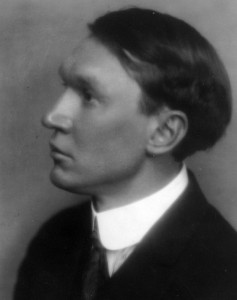 A serial improvisation in 12 equal setting Vachel Lindsay’s 1931 reading of his poem “The Mysterious Cat” to musical accompaniment. Vachel Lindsay is considered the father of modern singing poetry, as he referred to it, in which verses are meant to be sung or chanted. His numerous correspondences with the poet Yeats detail his intentions to revive the musical qualities in poetry as had been practiced by the ancient Greeks. Because of his use of American Midwest themes he also became known as the “Prairie Troubador.”
A serial improvisation in 12 equal setting Vachel Lindsay’s 1931 reading of his poem “The Mysterious Cat” to musical accompaniment. Vachel Lindsay is considered the father of modern singing poetry, as he referred to it, in which verses are meant to be sung or chanted. His numerous correspondences with the poet Yeats detail his intentions to revive the musical qualities in poetry as had been practiced by the ancient Greeks. Because of his use of American Midwest themes he also became known as the “Prairie Troubador.”
The accompaniment consists of 2 bass guitar lines, Rhodes electric piano, acoustic drum kit, African percussion, Eastern Indian percussion, rhythm guitar, and lead guitar. Vachel’s reading was noise reduced and processed through Roland’s “v-vocal” and constrained to E minor without the notes G and C. The recording was made in Sonar X1.
Download
http://clones.soonlabel.com/public/improvfriday/if20110114a-mysterious-cat.mp3
Vachel Lindsay – The Mysterious Cat
A chant for a children’s pantomime dance, suggested by a picture painted by George Mather Richards.
I saw a proud, mysterious cat,
I saw a proud, mysterious cat
Too proud to catch a mouse or rat—
Mew, mew, mew.
But catnip she would eat, and purr,
But catnip she would eat, and purr.
And goldfish she did much prefer—
Mew, mew, mew.
I saw a cat—’twas but a dream,
I saw a cat—’twas but a dream
Who scorned the slave that brought her cream—
Mew, mew, mew.
Unless the slave were dressed in style,
Unless the slave were dressed in style
And knelt before her all the while—
Mew, mew, mew.
Did you ever hear of a thing like that?
Did you ever hear of a thing like that?
Did you ever hear of a thing like that?
Oh, what a proud mysterious cat.
Oh, what a proud mysterious cat.
Oh, what a proud mysterious cat.
Mew . . . mew . . . mew.
4 replies on “The Mysterious Cat”
Hi Jake,
Did you read the wikipedia entry for Vachel? He apparently recorded Mysterious Cat just before he committed suicide.
Read the “poetry as performance” section. So there is perhaps even more irony involved 🙂
Here is were I obtained the original recording of Vachel’s reading. The site is a great resource.
I’d be interested in what you think after reading the entry and listening to the original.
Have a great day!
Chris
I could tell that you weren’t aiming for a child audience, but the poem is very childlike. That’s what causes the irony. I’m listening to grown-up music and hearing childlike words like “But catnip she would eat, and purr, / But catnip she would eat, and purr. / And goldfish she did much prefer— / Mew, mew, mew”.
It makes me wonder whether there’s something more sinister behind the poem. Why else would childish words be set to serious music? It’s almost like someone’s saying, “Kitty, kitty, kitty. *Pretty* little kitty” — while pushing on the pads of its foot to extend its claws.
Maybe Vachel’s reading of it was also childlike, or maybe it was very grown-up and ironic. It’s hard to tell after your manipulation of it.
Hi Jake, I was not aiming for a child audience, Instead what I wanted to convey was Vachel’s voice from the past resurrected in a modern context like an apparition. I’m not sure I understand your use of irony – could you elaborate on that?
Thanks,
Chris
Good manipulation of his vocal line and good accompaniment. It’s an odd juxtaposition of things, though: The poem is very childlike, but the music is very grown-up. If I were actually aiming for a child’s audience, I’d accompany it with something different. This has a lot of irony in it.